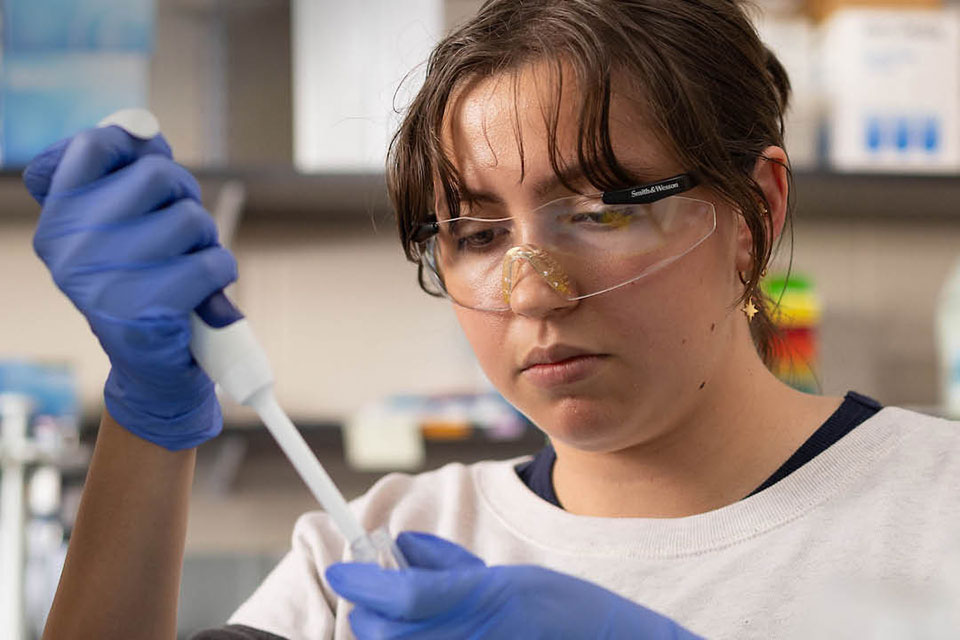Bachelor of Science in Biological Physics
Are you strong in physics and math, but also drawn to the life sciences? The bachelor of science degree in biological physics might be for you.
Our program is both interdisciplinary and integrated: you will master the techniques of mathematics, physics, chemistry and biology, and then learn to apply them to questions of biology and medicine. Our program also strongly emphasizes research: you’ll likely find yourself using microscopy techniques to study the molecular mechanisms of DNA-damage repair inside living cells, or pursuing projects involving theory, data analysis and computational simulations.
As a biological physics major, you’ll be well prepared for graduate school, where you might pursue a PhD in biomedical engineering, biotechnology, materials science or biophysics. Some of our recent graduates have gone on to earn advanced degrees from Harvard University, Carnegie Mellon University, Yale University, Caltech and University of California, Berkeley. Given the breadth of the major, you will also be well prepared for careers in biotechnology or the high-tech sector, medical school, or other professional studies.
Why Brandeis?
At Brandeis, biological physics is a quintessentially 21st century major. You will follow a core physics curriculum augmented by electives on molecular structure and biological processes, all taught by some of the finest scientists working in these fields today. Working one on one with faculty and graduate students, you will learn to use state-of-the-art equipment and do meaningful cutting-edge research. Physics is a strong and vital department at Brandeis, and biological physics is one of its fastest growing scientific fields. Our program is one of a handful in the country.
Academics and Research
Expand All
Our program provides a strong foundation in the physical sciences that underpin much of the modern revolution in biology. You will be trained as a thinker armed with the quantitative skills and technical abilities to address any biological or biomedical question.
Whether it’s during the semester or the summer, you’ll find lots of opportunities to work closely with a faculty member or graduate student, usually in a paid position. You’ll also have the chance to present your research at conferences and symposia held in the Boston area.
If you’re prepared for the challenge, you may pursue a BS degree with honors. To achieve honors, you must successfully complete an approved research project and an oral defense of your thesis.
Faculty and Student Excellence
Expand All
Our faculty are not only dedicated teachers, they are scholars who are widely recognized for their work, which is supported by grants from the country’s most prestigious funding organizations. Here are some recent faculty highlights:
-
Jané Kondev, chair of physics, won the Society of Biology Book Award for the undergraduate textbook Physical Biology of the Cell (2013) and in 2015 received a $1 million grant from the Hughes Foundation to advance undergraduate research.
-
Dorothee Kern is a professor of biochemistry (and former player for the East German national basketball team!) whose research on the structure, dynamics and function of enzymes is supported by the Howard Hughes Medical Institute.
-
Robert Meyer, professor of physics emeritus, is a recipient of the Benjamin Franklin medal in physics and the Buckley Prize from the American Physics Society for his work on liquid crystals.
-
As a biological physics major, you will be eligible for the Stephan Berko Memorial Prize for undergraduate research and for the Physics Department prize, given to a graduating senior.
-
Recently, biological physics major Leah Shapiro ’17 received Brandeis’ Giumette Academic Achievement Award for outstanding scholarship.
Beyond the Classroom
Expand All
As a biological physics student, you may take courses for credit at nearby Boston University, Boston College, Wellesley College, Tufts University and Olin College of Engineering.
You may choose to participate in the summer Research Experiences for Undergraduates program, which is funded by the National Science Foundation and takes place at institutions across the United States.
The Physics Club is open to all biological physics majors. Its activities include special lectures, outside trips, tutoring, outreach to local schools and special creative projects.
Distinguished scientists and scholars come from all over the world to give weekly seminars and colloquia. All are welcome.
Careers, Graduate Study and Alumni
Expand All
Our biological physics majors are well prepared to pursue careers in fundamental or applied research in biophysics, quantitative biology and biotechnology.
Nobel laureate Rod MacKinnon, a pioneer in the field of biological physics, is a Brandeis University graduate.
Many faculty in our related departments are also renowned scholars.

